Yet another side blog of @snowlessknitter, this one focused on my love of singing competition shows. I’m gonna write about what alumni from these shows (not just winners) are up to. This will mostly be focusing on the Idols format, but other formats (The X Factor, The Voice) might also be included.
Don't wanna be here? Send us removal request.
Text
I know it’s been a while since I posted here, but I have another Idols format winner to add to this list.

Eric Moyo, who was originally from Zimbabwe 🇿🇼 and won the only edition of Idols East Africa (which took place in 2008), died on Wednesday 20 December 2023 after suffering an brain hemorrhage during a performance in South Africa; he collapsed onstage and died at a local hospital a short time later. After his Idols win, Moyo embarked on a career as a gospel singer and at the time of his death was a member of the South African gospel music group Joyous Celebration. He was just 41 years old.
Joyous Celebration released a statement about his death, which reads in part:
“As a tenor singer, Eric brought joy to many through his electric performances and unique songs. A snazzy dresser of note. His stage presence was unmatched. His passing will leave a deep void in the Joyous family, and his legacy will live through his music, which touched the lives of many and made significant contributions to the gospel music genre. While we mourn his passing, let's celebrate his life and the impact he had on those around him. Eric may no longer be with us, but his spirit will live on through the beautiful music he created. Our thoughts and condolences go out to his family and friends during this difficult time.”
Idols Winners Who Have Passed Away
For my first real post here, while a bit sad, it’s worth noting that there are a few winners in the Idols format who have since died. There have been well over 200 winners in the Idols format spanning every continent except for Antarctica, and of those winners three have since died, the most recent in October 2019.

Sandeep Acharya was the first winner in the Idols format to die. He was born in Bikaner, Rajasthan, India 🇮🇳 in 1984 and won the second season of Indian Idol in 2006. He was planning to release his second album in 2013 but sadly died of liver disease at just 29 years of age on 15 December 2013. He was survived by his wife and a daughter.

Michael “Mike” Mohede was the second Idols winner to pass away. He was born in Jakarta, Indonesia 🇮🇩 in 1983 and first rose to fame in 2005 when he won the second season of Indonesian Idol. A few years later, he finished runner-up to Singapore’s 🇸🇬 Hady Mirza in the pan-Asian special edition Asian Idol. Over the course of his career he released three albums. He died on 31 July 2016 of a heart attack, at the age of 32.

The most recent Idols winner to die was Alphonso Williams, also known by his nickname “Mr. Bling Bling”. Born in Detroit, Michigan in 1962, he initially came to Germany 🇩🇪 when he was stationed there during his service in the United States Army. After his discharge from the Army, he remained in Germany permanently, marrying and having two children. After a brief participation on the German version of Got Talent, Das Supertalent, with his son, he auditioned for the German version of Idols, Deutschland sucht den SuperStar, when the show had decided to drop its upper age limit for its fourteenth season in 2017. (The Idols format is the only major singing show format that still typically imposes an upper age limit; on American Idol, the upper age limit is 28, whereas on DSDS, which Alphonso competed on, it’s usually 30, and the Norwegian version has had an upper age limit of 35 for several of its seasons. The X Factor and The Voice formats do not have upper age limits, and Got Talent has no age limit whatsoever.) At age 54, Alphonso became the oldest winner in Idols format history. Although he wasn’t hugely successful on the German charts, he continued his music career until he was diagnosed with advanced prostate cancer. He died on 12 October 2019 in Hamburg, Germany at age 57. Alphonso was also notable for being one of a handful of U.S.-based winners in the Idols format that won international versions of the show (others include Lusi Harutunyan, also known as Lucy Hart, from California who won the third season of the Armenian 🇦🇲 version, Hay Superstar, and New Jersey-born Panagiotis Tsakalakos, who won the second season of Greek Idol, becoming the first non-Cypriot to win any Greek version of the show in the process).
Hopefully, no other winners join this dubious club anytime soon.
1 note
·
View note
Text
Singing Shows and Eurovision: Sweden 🇸🇪 (Part Three: How’d They Both Manage to Finish 14th?)
We’ve finally reached our third and final part of this in-depth look at Idol Sweden’s success at what is undoubtedly Sweden’s biggest cultural institution, Melodifestivalen. Just to remind you, Melodifestivalen is the process that Sweden uses to select its entry for the Eurovision Song Contest each year. The only Eurovision national final with a bigger cultural impact is Italy’s Sanremo Music Festival (which actually inspired the creation of Eurovision), which itself has a rich recent history with X Factor Italy (and is worthy of its own separate series).
In this post, we meet our final two Idol alums who later went on to win Melodifestivalen and thus represent Sweden at the Eurovision Song Contest: Robin Stjernberg and Tusse Chiza.
Robin Stjernberg


Robin James Olof Stjernberg was born on 22 February 1991 in Hässleholm, Sweden. Hässleholm is located in Skåne County (also called “Scania” in English) in southern Sweden. (Skåne County is also home to one of Sweden’s largest cities, Malmö, which was the host city for the Eurovision that Robin would represent his home country in. More on that shortly.) Although he is better known for his run on Idol, his music career actually started a few years earlier when he was a teenager. After winning a local singing contest in Malmö when he was 15, the following year he took part in an event in Stockholm (at the city’s Globe Arena) which resulted in him being selected as part of a four-member boy band called What’s Up!, which also included future Melfest winner Eric Saade as one of its original members. The band released four singles in its three or so years of existence, with the two charting singles both reaching the Top 20 in Sweden, although their debut single, “Go Girl!”, was the most successful, peaking at #5. The same year that original What’s Up! member Eric Saade won Melodifestivalen and represented Sweden at Eurovision in Düsseldorf would be the year that Robin decided to try and launch his own solo career on Idol.
Robin, aged 20 at this point, ended up auditioning for Idol 2011, performing “Who You Are” by Jessie J for the judges. He ended up getting through to the next round and made it all the way to the voting rounds. He was one of just five male contestants to make it into the Final 12 that season. Over the course of the Finals, Robin never landed in the Bottom 2, and ended up making it to the Finale (in fact, he was the only one of the Final 2 to avoid the Bottom 2 the entire season). In the Finale, he would end up losing to 16-year-old Amanda Fondell by just a 4% margin. It would not be the the last time that Stjernberg and Fondell would meet in competition.
Immediately following his Idol run, Stjernberg released his own version of the show’s winner’s single (or what fans like to call a “coronation song”), “All This Way”, but it did not chart. (Fondell’s version went all the way to #1 in Sweden.) He also released an album in January 2012 containing studio versions of the songs he’d performed on Idol 2011 called My Versions. The album debuted and peaked at #2.
Robin’s real break would come the following year, and a lot of eyes were on Sweden because in 2012 (the previous year) Loreen had brought Eurovision back to Sweden on the heels of her win in the 2012 Contest in Baku, Azerbaijan 🇦🇿. So, whoever won Melodifestivalen 2013 was going to be performing at Eurovision on home soil. (And, as it turns out, home soil for Robin would be pretty close to home, as the Contest would be hosted in Malmö, not far from his birth city of Hässleholm.) He would be competing with the song “You”. As it turned out, the girl he lost to on Idol, Amanda Fondell, would also be competing at Melodifestivalen as well, with the song “Dumb”. Unlike on Idol, though, they did not end up competing face-to-face, as Amanda was eliminated from the competition in her semifinal. While Robin did not qualify directly to the Final in his semifinal appearance, he did end up in the Andra Chansen, or “Second Chance” round. (Interestingly, Loulou Lamotte’s first appearance at Melodifestivalen ended with her elimination from the Andra Chansen round at this same edition.) After the two rounds of voting, “You” was one of two songs that survived the Andra Chansen round and advanced to the Final. In the Final, he ended up winning the International Jury Vote and came second in the Public Vote. What ended up deciding the Final in his favor that the song that ultimately finished in second, “Heartbreak Hotel” by Yohio, had won the Public Vote points by 28 points but had placed a dismal ninth in the Jury Vote (30 points to Robin’s 91). Thus, “You” became the first ever Andra Chansen song to go on to win Melodifestivalen.
Two months later would come Robin’s time to sing for Sweden on home soil, and as the host country’s entry Robin did not have to sing in a semifinal. So his one shot came in the Final, which had 26 countries taking part. At this time, points were awarded by a 50/50 combined system determined by average ranking amongst juries and televote. While Sweden finished 3rd in the jury rankings (getting an average ranking of 8.05), it finished a disappointing 18th in the televoting rankings (getting an average ranking there of 16.19), which sealed Sweden’s fate, finishing 14th overall with just 62 total points. The title ended up going to fellow Nordic country Denmark 🇩🇰, who got its third Eurovision win with “Only Teardrops” by Emmelie de Forest. (Although strangely enough, Emmelie has a connection to Sweden herself, as her father was Swedish.)
After Eurovision, Robin continued on with his solo career as a performer as well as becoming a successful songwriter, and managed to have another song of his compete on the Eurovision stage when Robin Bengtsson (who we met in Part Two), singing “I Can’t Go On” (co-written by Stjernberg) would bring Sweden a fifth place finish in 2017, its fourth straight top 5 finish (a streak that began in 2014, the year following Stjernberg’s participation). It was also part of a streak of 6 Top 10 finishes for Sweden, one that ended in 2021 (with our final Idol alum in this series). He also co-wrote “In the Middle”, which was The Mamas’ entry for Melodifestivalen 2021 (which ultimately did not result in a third Melfest win for the group). Stjernberg continues to write and record music and has also become a record producer for artists both in and outside of Sweden.
Tusse (Tousin Chiza)


In order to understand Tusse’s story, we first have to understand the history of the country where he was born. This is by no means a complete history, but I want to summarize it as thoroughly as I can. If you’d like to learn more about the history of the Democratic Republic of the Congo, I suggest you read Congo: The Epic History of a People by David van Reybrouck. Van Reybrouck himself is Belgian, but he made many trips to Congo-Kinshasa (to differentiate it from the Republic of the Congo, whose capital is Brazzaville and is sometimes called Congo-Brazzaville) and interviewed many Congolese people to learn about their history from their own perspective. It’s very long but quite comprehensive.
Tousin Michael Chiza (better known by his nickname Tusse) was born on New Year’s Day 2002 in the Democratic Republic of the Congo 🇨🇩, a country in Central Africa that during the European colonial period was first a personal property of Leopold II, King of the Belgians, called (somewhat ironically) the Congo Free State. After numerous atrocities against the Congolese people under his watch came to light, Leopold II ceded control of the colony to the Belgian government, who ran it as the Belgian Congo until it gained independence in the early 1960s. After Prime Minister Patrice Lumumba was deposed and executed, Joseph-Désiré Mobutu (later known as Mobutu Sese Seko) took control of the country, eventually declaring himself President for Life and renaming it Zaire in the early 1970s. He ran it as a dictatorship until 1997. Mobutu’s government had already begun weakening in the early 1990s (in addition to the dictatorship, the country also had internal regional conflicts and economic decline), but the Rwandan Genocide two years earlier caused much political instability in the eastern part of Zaire (where the Genocide had spilled over into), which resulted in Rwanda invading in 1996. This was the opening salvo in what became known as the First Congo War, which lasted around 6 months from October 1996 to May 1997. The war resulted in Mobutu’s overthrow (although by this point Mobutu was terminally ill and he would die in exile in Morocco in September 1997). Laurent-Désiré Kabila took over as President and the name was changed back to its original name at independence, the Democratic Republic of the Congo. (Laurent-Désiré Kabila himself would be assassinated in 2001, and his son Joseph took over as President, which he remained until 2019. The country’s current President is Félix Tshisekedi.)
While the end of the First Congo War came quickly, it did not resolve the tensions that led to it, and only a year after the First Congo War ended, the Second Congo War began. It was during this war that Tusse was born. And although that war ended when he was about a year and a half old, violence continued (and actually still does continue) in parts of the country, and Tusse was not spared from it. When he was five years old, Tusse and his aunt fled the Democratic Republic of the Congo for Uganda and lived in a refugee camp there for three years. In 2010, at just 8 years old, Tusse and his aunt were finally able to leave war-torn Central Africa for the much more peaceful Sweden. At thirteen, he moved in with a family in the Swedish village of Kullsbjörken, located in central Sweden near cities like Falun and Borlänge. Three years later, in 2018, he auditioned for the Swedish talent show Talang 2018 (the Swedish version of Got Talent) under his full name, Tousin Chiza. Although he was eliminated from that competition in the semifinals, it did not kill his dreams of becoming a singer.
The following year, he decided to make another go at a singing competition, this time auditioning for Idol 2019 at the age of 17. He auditioned with “Locked Out of Heaven” by Bruno Mars. He easily advanced from his semifinal and got into the Final 12. Over the course of the competition, he ended up in the bottom 2 just once (at the final 5), and on 6 December 2019 he was declared the winner over Freddie Liljegren. Immediately following the competition, he released his debut single “Rain”, which only managed to peak at #63 on the Swedish singles chart, but he’d left an impression on the producers of Melodifestivalen, and they offered him an invitation to participate whenever he felt ready. He didn’t take part in the 2020 edition, but when 2021 came around, he was ready.
It was announced he’d be performing “Voices”. Tusse’s first performance at Melodifestivalen was in the competition’s third semifinal round of four, which he ended up winning by about 650,000 votes (semifinal rounds are conducted solely by public voting) over past Eurovision winner Charlotte Perelli (who won in 1999 singing “Take Me to Your Heaven” under her maiden name Charlotte Nilsson), and both of them advanced directly to the Final. At the Melodifestivalen 2021 Final a few weeks later, he ended up winning both the Jury and Televote, the latter of which he won decisively by about 1.4 million votes over The Mamas (who had finished second in the Televote and third overall; Eric Saade was the runner-up in the combined total points), and Tusse garnered nearly 3 million votes alone.
Unlike Robin Stjernberg, Tusse and “Voices” were going to have to qualify from a semifinal if Sweden wanted to make the Grand Final at Eurovision 2021 in Rotterdam, Netherlands 🇳🇱. His turn came in the First Semifinal. After all the votes were counted and verified, he’d scored well enough to get Sweden into the Grand Final. (After the Contest, it was revealed Sweden had finished 7th in that Semifinal with 142 points, a little over half of semifinal winner Malta’s 🇲🇹 total.) In the Final, Tusse performed second-to-last, but the prime performance spot was not enough to get Sweden to the Top 10, and in fact the country scored fewer points in the Final, 109, than it did in the semifinal. Under the current split voting system in place (two sets of points awarded, highest combined total wins), Sweden finished 11th in the Televote and 17th in the Jury vote. Sweden placed 14th overall and it marked the first time since Robin Stjernberg’s appearance 8 years (and 7 Contests…remember, there was no 2020 Contest) that Sweden finished outside the Top 10.
On the positive side, Tusse did manage to score his first number one single on the Swedish singles chart with “Voices”, and managed to chart in a few other countries after the Contest as well. It’s been less than a year since his Eurovision moment, but Tusse continues to perform and has also become well known in Sweden and the Eurofandom at large for his unique and eclectic fashion sense. Hopefully the future ahead of him is bright and full of great success!
So…with that, we have met all seven Idol Sweden alums to have gone on to win Melodifestivalen and perform for Sweden on the Eurovision stage!
What’s Next?
As of early February, several people connected to Idol Sweden are taking part in Melodifestivalen 2022. Anna Bergendahl and Robin Bengtsson are both making returns hoping for another Melfest win. Former Idol winners Lisa Ajax (who won season 10 in 2014) and Liamoo (who won season 12 in 2016) are both making returns looking for their first Melfest win. John Lundvik (who Loulou Lamotte and The Mamas sang backup for in 2019) is back, this time without The Mamas and performing in Swedish. And even Idol judge Anders Bagge is joining in on the Melfest fun. (Fun fact: Bagge co-wrote Azerbaijan’s 🇦🇿 2012 entry, its title defense, “When the Music Dies” by Sabina Babayeva. It managed to give the host nation a 4th place finish.)
Could any one of them end up winning Melodifestivalen? We’ll find out on 12 March.
I hope you’ve all enjoyed this series of posts! This took me several months to draft and finish. I had initially planned to run these last summer, but life happened and they fell by the wayside. I then decided to try and get these ready in time to post for Melodifestivalen and post them on the Saturdays during which the competition was running.
1 note
·
View note
Text
Singing Shows and Eurovision: Sweden 🇸🇪 (Part Two: One Season, Three Alums, Four Melfest Wins)
Of the seven Idol Sweden alumni who went on to win Melodifestivalen, three of them made it to the final set of voting rounds in the same season: Idol 2008, which served as the show’s fifth season. Between these three alums, there are four combined Melodifestivalen wins and three Eurovision appearances. (I’ll explain that discrepancy when we get to the third alum in this part.) One of them also holds a pretty dubious distinction in Sweden’s Eurovision record. Speaking of which, she’s up next in our series! So, let’s get to it!
Anna Bergendahl
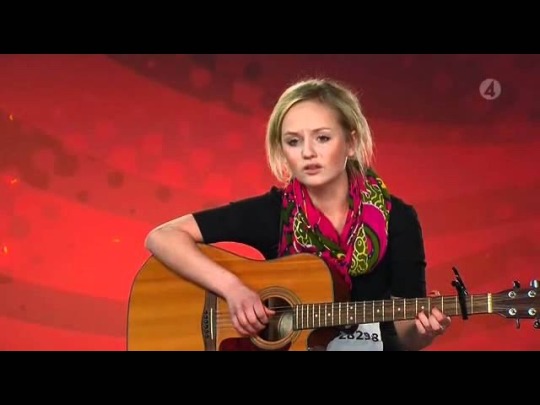
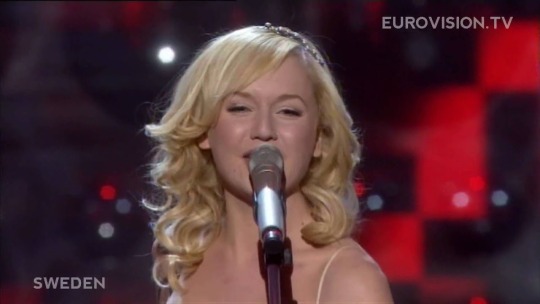
Anna Henrietta Bergendahl was born 11 December 1991 in the Hägersten district of Stockholm, and was raised in the cities of Nyköping and Katrineholm, both of which are located a bit southwest from Stockholm. She has connections to the British Isles, as one of her grandmothers is originally from Ireland, and Anna first performed in front of an audience as a child in a cathedral in York, England. Anna auditioned for Idol 2008 with the Bonnie Raitt song “Have a Heart” and became known on the show for her folk-pop sound, which was unusual for singing shows at the time, and (if I caught the footage correctly) auditioned for the show at a time when Idols shows were just starting to allow contestants to play instruments onstage (and in some versions, even in auditions; Australian Idol began allowing them in 2006, while American Idol and Idol Sweden both began allowing contestants to perform with instruments in their 2008 seasons), and marked an evolution in the Idols format from simply being a singing contest (at times being glorified karaoke) to a performing contest to look for new overall artists. Anna took advantage of this format change from her very first audition. Anna was almost eliminated before the Finals even started, landing in the Bottom 2 in the last Semifinal round show, where 11 of the 12 remaining singers would advance to the Finals. Luckily for her, she avoided elimination that week. She would go on to land in the bottom group two more times, being eliminated from the competition in fifth place on her second trip on the episode taking place on 21 November 2008.
A few months after her Idol journey came to an end, Anna signed her first record deal in early 2009 and was approached by songwriters and producers Kristian Lagerström and Bobby Ljunggren about working on a song together to submit to Melodifestivalen 2010. Lagerström and Ljunggren wrote and produced the song, and Anna recorded it. That song, “This Is My Life”, was selected to compete in Melodifestivalen 2010 and won the first round of televoting in its semifinal, progressing directly to the Final. In the Final, “This Is My Life” placed second in the Jury voting, but ended up winning the public televote and by a large enough points margin over the Jury vote winner (“Keep on Walking” by Salem Al Fakir) to get the most points and win Melodifestivalen 2010. This marked the first time since 1998 that a ballad (slow-tempo) song had won Melodifestivalen, the last one being “Kärleken är” — which means “Love Is” and is roughly pronounced as “SHAR-leh-ken AIR” — by Jill Johnson, which was inspired by the death of Princess Diana the year before and was the last Swedish Eurovision entry to date to be performed in Swedish. Anna’s Melodifestivalen win also marked the first time that an Idol Sweden alum would go on to win Melodifestivalen (although Loreen and Måns Zelmerlöw competed on Idol before Anna did, they both won Melfest after Anna).
Then came Eurovision 2010, held in Oslo, Norway 🇳🇴 (by virtue of another Idols alum, Alexander Rybak — who was a semifinalist on season 3 of Idol Norway — winning the 2009 Contest). Sweden was drawn to perform in the second Semifinal, and Anna ended up performing 6th in the running order. When it came time for the results…for the first time ever, Sweden failed to qualify for the Final. It marked the first time since 1976 that Sweden was not competing in a Eurovision Final (as Sweden had withdrawn that year due to protests against the Swedish broadcaster spending money on its Eurovision efforts after it had hosted the Contest the year before), and the first and only time to date that Sweden has failed to qualify under the current multi-day Semifinals & Final format used at Eurovision. The Final was won by Germany’s 🇩🇪 “Satellite” by Lena, and when the full voting results were released following the 2010 Contest, it was revealed that Sweden had placed 11th in its semifinal (just outside the cutoff line of the Top 10 who would qualify), and was just 5 points behind the 10th place song that ended up qualifying, sent by Cyprus 🇨🇾 (“Life Looks Better In Spring” by Jon Lilygreen & The Islanders).
Since her infamous Eurovision appearance, Anna has released two studio albums and several EPs. She has also competed at Melodifestivalen two additional times, in 2019 and 2020. In 2019, she competed with the song “Ashes to Ashes”. It ended up finishing in the Top 4 in its semifinal but had to compete in the Second Chance round, where it ended up qualifying to the Final. “Ashes to Ashes” ultimately placed 10th in the Melodifestivalen 2019 Final, and “Too Late for Love” by John Lundvik (featuring one of the other two alums in this article on backing vocals) ended up going to Tel Aviv and placing 5th at Eurovision 2019. In 2020, she competed with “Kingdom Come”. That song won its semifinal and advanced directly to the Final, where it placed third. I’ll get to the winning song from that Melfest a little later. As of early February 2022, she is set to compete at Melodifestivalen again with “Higher Power”.
Robin Bengtsson
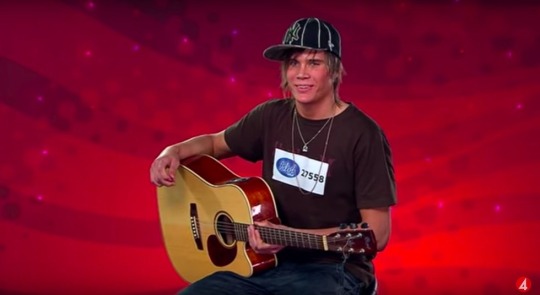
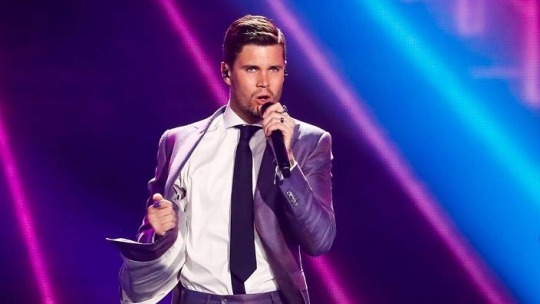
Robin Bengtsson was born Hans Robin Gustav Bengtsson on 27 April 1990 in Svenljunga, Sweden, which is located in the southwestern part of the country. This part of Sweden is more rural, and in some ways it kind of showed with Robin’s initial audition for the show. But, he managed to impress the judges with a rendition of “Bring It On Home To Me” by Sam Cooke and he was rewarded with a Golden Ticket to the next round. He eventually made it to the final voting rounds, surviving four trips to the bottom group before being eliminated in third place, just one week before the Final. Robin was the last remaining Swedish-born contestant remaining in the competition that season, as both of the Final Two were born outside of Sweden: eventual winner Kevin Borg (who was originally from Malta 🇲🇹) and runner-up Alice Svensson (who was born in Vietnam 🇻🇳 and adopted by Swedish parents). It was just the second time that happened in the Idols format’s history to that point (the first being Greece’s 🇬🇷 only season of its first Idols series, Super Idol; winner Stavros Konstantinou was from Cyprus 🇨🇾, and runner-up Tamta Goduadze — who herself would eventually represent Cyprus at Eurovision — was originally from Georgia 🇬🇪).
After his Idol run, he signed a record deal and released his first post-Idol single, “Another Lover’s Gone”, in 2009. He would continue to release singles from then on as well as appear on several TV shows, including the Scandinavian version of Wipeout, where he placed 2nd in his episode. He released his first EP in 2014, Under My Skin, but it wasn’t until 2016 that he started making real waves on the Swedish music scene again, when he was selected to take part in Melodifestivalen that year with the song “Constellation Prize”. This was a high-stakes competition, as the acts were all competing for the right to represent Sweden on home soil, thanks to Måns Zelmerlöw’s win at Eurovision 2015. Robin’s song ended up qualifying directly to the Final from its semifinal. In the Final, though, it ended up finishing fifth in the Jury voting, fourth in the public televote, and an overall fifth place finish. The winning song that year was “If I Were Sorry” by Frans Jepsson Wall (or just “Frans”), who at 17 was the second youngest Melfest winner to that point (the youngest being Carola — yes, that Carola, who won Eurovision 1990 — who first won Melfest in 1983 at 16 years old). Frans ended up giving Sweden a 5th place finish at Eurovision 2016.
The following year, he got another shot at Melfest glory, set to compete at Melodifestivalen 2017 with “I Can’t Go On”. Almost immediately he became a favorite, as the stage show involved Robin and several male dancers in crisp suits doing synchronized choreography on treadmills (think of OK Go’s “Here It Goes Again” music video, but a little more sophisticated). He won his semifinal with over 1 million votes across two rounds of voting. When it came time for the Final, he ended up placing second in the public Televote (behind Nano), but his 20-point margin over Nano in the Jury votes was enough to give him the win and the ticket to Eurovision 2017 in Kyiv, Ukraine 🇺🇦. This also marked Robin Stjernberg’s second Melfest victory, although as a songwriter. (We’ll meet Robin Stjernberg in Part Three.)
Fast forward to Eurovision 2017 in Kyiv. Sweden was drawn to perform in Semifinal 1. After everyone had performed and the points were tallied, Robin made it into the Final. (It was revealed after the Contest that Sweden finished 3rd in that Semifinal, with the two songs ahead of Robin’s going on to place in the Top 3 in the Final.) Then came the Final. Twenty-six countries performed, and a total of 42 countries cast votes. After all the points came in, Sweden got 344 points, which could have been more than enough to win under the old system…but…
…the previous year Eurovision had introduced a new voting system: instead of points being awarded by a combined Jury/Televote system (where only one score was given and each portion of the vote accounted for 50% of the point total), it switched to the points system currently used at Melodifestivalen, where Jury and Televoting points are awarded as two separate sets of points and the country with the highest combined total after all points have been awarded is the winner. This makes for a bit more exciting results process, as it can result in a country winning neither set of voting still winning the overall Contest because the Jury vote winner finished much lower in the Televote, and vice versa. This is exactly what happened in 2016, where Ukraine ended up winning because the Jury vote winner, Australia, finished fourth in the Televote, while the Televote winner, Russia, finished fifth in the Jury vote; Ukraine finished second in both sets of voting. The same thing also happened in 2019, where the Jury vote winner, North Macedonia, finished 12th in the Televote, while the Televote winner, Norway, finished 18th in the Jury vote. The winner, the Netherlands, finished 2nd in the Televote and 3rd in the Jury vote. But…back to Eurovision 2017.
When the Final came around, Portugal (who had won Sweden’s semifinal) ended up running away with the competition, winning both sets of voting (the only time this has happened to date under the current voting system; Israel did win the Televote the following year, but Austria won the Jury voting). Portugal set a new record for most points scored by a winning song (“Amar pelos dois” by Salvador Sobral) with 758 total points, easily defeating runner-up Bulgaria by a 143-point margin. Moldova (who had finished 2nd ahead of Sweden in Semifinal 1) ended up taking third place, while Sweden finished in 5th place once again, getting third place in the Final’s Jury vote and 8th place in the Final’s Televote. Not another win for Sweden, but still a very good finish.
Since his Eurovision appearance, Robin Bengtsson has gone on to compete at two more Melodifestivalens: in 2020, with the song “Take a Chance”. That song gave Robin his third appearance in a Melfest final, where he ultimately finished in 8th place overall. He is also competing at Melodifestivalen 2022 with “Innocent Love”, but as of 4 February 2022 his semifinal had not taken place yet. The winning act of Melodifestivalen 2020 included our final Idol Sweden 2008 alum in this post, and let’s go ahead and meet her.
Loulou Lamotte
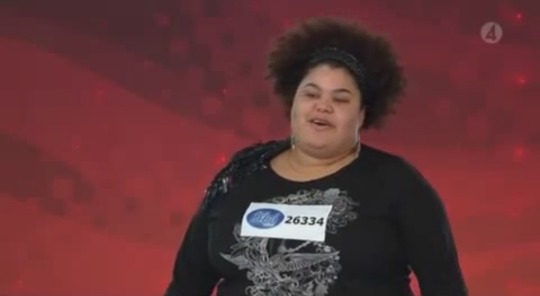
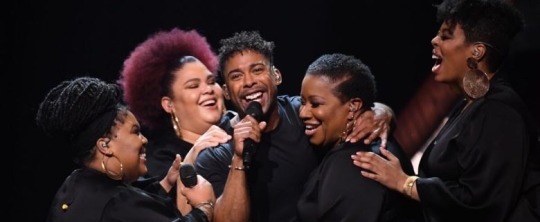
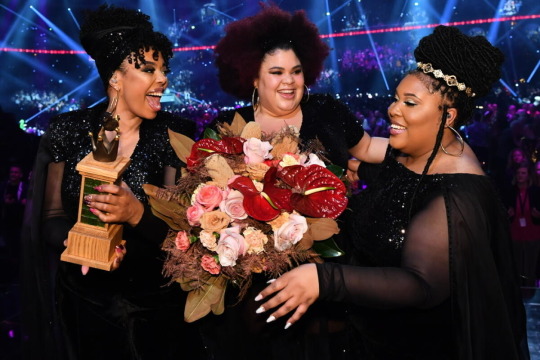
(Yes, Loulou gets three pictures, because those latter two pictures represent each of her Melodifestivalen wins. I’ll explain soon enough.)
Stephanie Louise Caroline Lamotte, otherwise known by her nickname “Loulou”, was born on 16 April 1981 in Malmö, Sweden (which is the country’s second largest city). She is of Swedish and African-American ancestry. Loulou auditioned for Idol 2008 at the age of 27 (which by Idols standards is quite old, as most Idols shows have an upper age limit of around 30; by comparison, she was born the same year as Jay Smith, who won Idol 2010 two years later at the age of 29 and remains the Swedish version’s oldest winner by age) with “Put Your Records On” by Corinne Bailey Rae. (That song went on to have renewed success a decade later thanks to a cover by Utah-based artist Ritt Momney.) Loulou eventually made it to the finals, but was eliminated in 9th place. She did not release any singles immediately following the show, but did appear on the Swedish version of Wipeout the following year.
Her first Melodifestivalen appearance took place in 2013, accompanying (along with Oscar Zia, who was a finalist on the only season of The X Factor Sweden the previous year, and will be hosting Melodifestivalen 2022) Behring Miri on his song “Jalla Dansa Sawa” (“Come On, Let’s Dance Together”). The song failed to advance from its semifinal and was eliminated in the Andra Chansen round, but still made the Top 5 on the Swedish singles chart.
Six years later, in 2019, she made her second Melodifestivalen appearance, this time as one of four backing singers for John Lundvik, competing with the song “Too Late for Love”. And this time, his backing singers got a name of their own: The Mamas. The other three were Paris Renita, Ashley Haynes, and Dinah Yonas Manna.
Lundvik had started his adult life as a competitive sprinter, but later retired from athletic competition to focus on songwriting full time. His first breakthrough as a songwriter came in 2010, when he co-wrote with Jörgen Elofsson (renowned in the pop world for writing songs for artists like Britney Spears, Kelly Clarkson, and Celine Dion, among many others) “When You Tell the World You’re Mine”. The song was composed for the wedding of Crown Princess Victoria of Sweden and Daniel Westling (who is now styled as Prince Daniel, Duke of Västergötland) as a gift to the couple, and it was performed at their wedding by Agnes Carlsson (winner of season 2 of Idol Sweden) and Björn Skifs (Swedish pop legend, former Melodifestivalen winner, and best known outside of Sweden as the lead singer of Blue Swede, who had a huge international hit with their cover of “Hooked on a Feeling” in the early 1970s). Lundvik would continue to be a prolific songwriter, also becoming a performer in 2016 and making his Melodifestivalen in 2018 with “My Turn”, which reached the Final, but lost out to “Dance You Off” by Benjamin Ingrosso.
So, when it came time for “Too Late for Love” to compete, it qualified to the Final, and then won the televote and jury points (the jury points by quite a decisive margin) and ended up getting the Melodifestivalen 2019 win, the first of two for Loulou.
At Eurovision 2019, held in Tel Aviv, Israel 🇮🇱, “Too Late for Love” ended up finishing third in its semifinal, advancing to the Grand Final to take place two days later. (The other two songs to finish ahead of Sweden were from the Netherlands 🇳🇱 and North Macedonia 🇲🇰…more on those in a minute.) “Too Late for Love” was actually one of two songs penned at least in part by Lundvik to take part in Eurovision 2019, the other being the United Kingdom’s 🇬🇧 entry, “Bigger Than Us” (performed by Michael Rice…which ultimately finished in last place in the Final). Once all the votes came in, Sweden ultimately finished in…5th place. Initially, it looked as though Sweden had won the Jury voting, but after the 2019 Contest it was revealed that the aggregate jury voting for Belarus 🇧🇾 (whose jury had been dismissed after the Semifinals due to some jurors sharing their votes during the Contest, which is against the rules; the Belarusian jury vote for the final was compiled by taking regional jury voting patterns into account and estimating how they would have voted in the Final) had been incorrectly compiled (mainly, their points had been awarded in the reverse order from what they had intended), and once the Belarusian jury points were awarded in their correct order, it turned out that North Macedonia had won the Jury voting (and Sweden had finished second). A ninth-place Televoting ranking killed Sweden’s chances of winning (just as Televote winner Norway’s 18th-place finish in the Jury vote killed its chances of winning). Ultimately, the win ended up going to the Netherlands 🇳🇱, who had finished third in the Jury voting and second in the Televote.
In 2020, The Mamas would make another appearance at Melodifestivalen, this time on their own and as a trio, as original member Paris Renita decided to leave the group after Eurovision 2019. This time they competed with a song called “Move”, which won (and opened) the first Semifinal round, advancing directly to the Final. In the Final, held on 7 March 2020, they tied for first place in the Jury vote and won the Televote by just 1 point, narrowly handing them their second straight Melodifestivalen win and making Loulou just one of a handful of artists to win Melodifestivalen multiple times (others including Björn Skifs, Carola Häggkvist/Carola, Charlotte Nilsson/Perrelli), and The Mamas just the second group to win it twice, after Family Four in the 1970s, although Family Four did it twice as lead artists.
Four days later, the World Health Organization declared a global pandemic of the SARS CoV-2 virus, which caused a mysterious disease that had only been identified in humans about 2.5 months earlier in late December 2019, COVID-19 (often now shortened to just “COVID”). All of a sudden, The Mamas and their participation at the planned 2020 Contest in Rotterdam was uncertain.
A little more than a week after the pandemic was declared, the EBU announced its decision to cancel the planned 2020 Contest, which was to take place in Rotterdam. As the EBU also made the decision to not make the songs chosen for the 2020 Contest eligible for 2021, this meant that The Mamas would miss out on their Eurovision moment as lead artists unless they could manage another Melodifestivalen victory. They did make one more attempt in Melodifestivalen 2021 (staged in a single venue without a live audience) with “In the Middle” and advanced to the Final. Alas, the third time did not pan out for them as they ultimately finished 3rd overall and the ticket to Rotterdam went to Tusse Chiza, who we will meet in the third and final part of this series.
That is Part Two of my planned three-part series. Stay tuned for the final two Melodifestivalen winners who got their start on Idol Sweden: Robin Stjernberg and Tusse!
2 notes
·
View notes
Text
Singing Shows and Eurovision: Sweden 🇸🇪 (Part One: The Two Eurovision Winners)
So, in the Introduction, I revealed that I am beginning what I hope will become a recurring series on this blog (as well as my Eurovision-themed side blog, @american-eurovision-nerd, to which I’ll be reblogging these posts) where I chronicle different singing shows in certain countries, and how they’ve gone on to influence the Eurovision Song Contest in the last couple of decades, since these shows started becoming popular. And I’ve decided to start with what has to be the most successful country and singing show in Eurovision’s most recent history: Idol Sweden. In the Introduction, I went over a basic history of the Idols format in Sweden, its winners, and the alumni who have gone on to compete in Sweden’s national selection for Eurovision and easily one of the country’s most popular shows, Melodifestivalen. Now, we get to meet two of Idols Sweden’s earliest alumni, and the two who have also had the most success at Eurovision: Loreen and Måns Zelmerlöw.
Loreen (Lorén Talhaoui)
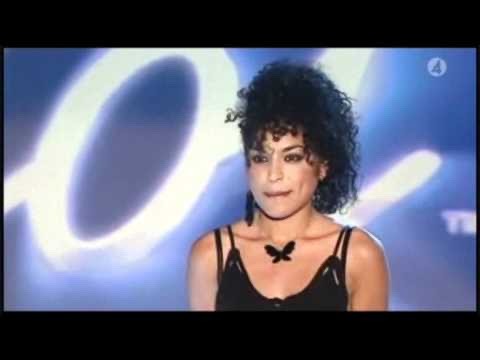
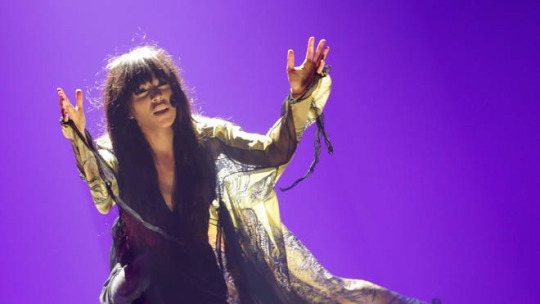
Loreen was born Lorine Talhaoui on 16 October 1983 in Stockholm to parents were originally from Morocco and part of the Berber ethnic group. She was raised in Västerås, in central Sweden. In 2004, when she was 20 (she turned 21 during the competition), she auditioned as Lorén Talhaoui (in Swedish, “Lorén” is still pronounced roughly as both Lorine and Loreen are) for the very first season of Idol Sweden, Idol 2004, and made it into the voting rounds. She almost didn’t make it into the group of finalists due to finishing third in the public vote of her semifinal group, but after the semifinal rounds were completed, the judges were given the option to pick one person from the semifinalists who had finished third or fourth in their group’s public vote. She was selected and joined the group of finalists in the series’ first live show. Over the course of her Idol run, she landed in the bottom group 3 times, being eliminated on her third trip and finishing in 4th place overall. She released her first single not long after her Idol run, and then took a hiatus from music for a few years, during which she worked as a producer and director for several television shows in Sweden.
In 2011 she made her return to music and entered her first edition of Melodifestivalen. Her song was called “My Heart is Refusing Me”, and in her semifinal, she finished...fourth. But luckily, Melodifestivalen in recent years has had an additional round called Andra Chansen, or the “Second Chance” round. In this particular round, the songs that finished third and fourth in each semifinal (as the top two in each semifinal advance directly to the Final) get assigned into duels with a quick public vote determining which song from each duel goes into the Final. Unfortunately, she ended up losing her duel and was eliminated from the 2011 competition. But the following year, she returned with a vengeance with “Euphoria”. She qualified directly from the first semifinal to the Final and then won the final pretty decisively by winning both the Jury vote and a plurality of the public vote, finishing about 10% ahead of the runner-up (and she and the runner-up, Danny Saucedo, were the only two finalists to get double-digit percentages of the public vote).
This brings us to Eurovision 2012 in Baku, Azerbaijan 🇦🇿. “Euphoria” pretty easily won its semifinal with 181 points, winning by a 22-point margin over second place Serbia 🇷🇸 in that semifinal. In the Final, “Euphoria” ended up setting records and won Eurovision 2012 with 372 points (a 113-point margin over runner-up Russia 🇷🇺), the second-most points up to that point (only behind Norway’s 🇳🇴 “Fairytale” by Alexander Rybak), and the most 12-points awarded under the voting system in use at the time. In the Final, the song received points from 40 of the 41 countries eligible to vote for it (remember, countries can’t vote for themselves). Only Italy 🇮🇹 did not give Sweden any points.
Since her big Eurovision win, Loreen has appeared in Melodifestivalen one additional time. In 2017, she entered once again with “Statements”, and ended up in the Second Chance round once again. Unfortunately, she was eliminated in her duel. The winner of that Melodifestivalen was “I Can’t Go On” by Robin Bengtsson, who we’ll get to in Part 2.
Måns Zelmerlöw

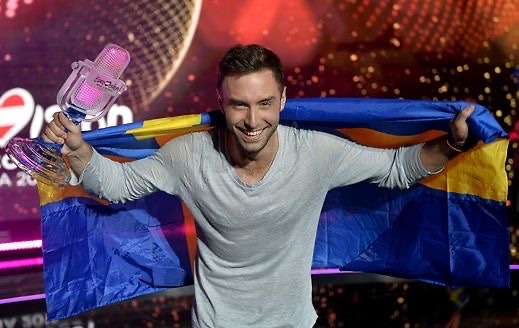
Måns Petter Albert Sahlén Zelmerlöw (phew 😅, that’s a mouthful) was born 13 June 1986 in Lund, Sweden (located near the very southern tip of Sweden) and was raised in Lund as well. A few months before his Idol audition, he and his family were vacationing in Khao Lak, Thailand 🇹🇭 when the area was hit by the 2004 Indian Ocean earthquake and the devastating tsunami that followed. Thankfully, Måns and his family were unharmed (thanks to efficiency and really good timing), but somewhere between 4,000-10,000 (including local residents and foreign tourists alike) died in Khao Lak as a result of the disaster. They managed to survive because of Måns’ mother insisting they pack up the night before, since they were supposed to be checking out the next day, and they checked out and left the hotel literally minutes before the tsunami hit. It was only when they saw water coming up the road that they realized something was wrong.
Måns, who was 19 at the time his season took place, auditioned for Idol Sweden’s second season, Idol 2005, and made it into the voting rounds. He won the vote in his semifinal and progressed into the final voting rounds. (One of the other semifinalists from his season, Anton Hård af Segerstad, would later become a co-writer of Måns’ big song, but we’ll get to that later.) In the finals, he ended up in the bottom group three times, being eliminated in his third trip, and finishing fifth overall. The season was ultimately won by Agnes Carlsson, who made history as the first female wildcard contestant to win an Idols show and one of only a handful of wildcard contestants to have done so worldwide. Carlsson herself would go on to compete at Melodifestivalen 2009 with the song “Love Love Love” (this edition was also Måns’ second Melfest appearance, which I’ll get to momentarily). She did well enough in both rounds of her semifinal’s voting and advanced to the Final, where she ended up finishing 8th.
Måns’ first appearance in Melodifestivalen would come a little over a year after his Idol run, in the 2007 edition. (In Sweden, Idol typically runs in the autumn with a December finale date, while Melodifestivalen runs in February and early March in order to select Sweden’s Eurovision entry in time for the mid-March deadline set by the EBU.) The song he competed with was called “Cara Mia” and he won his semifinal, advancing directly to the Final along with Sebastian Karlsson, who was the runner-up on Måns’ season of Idol, and given their surnames have slightly different spellings, let me stress that Sebastian Karlsson is not related to the winner of that season, Agnes Carlsson. (Funny enough, there was also a Magnus Carlsson competing in that semifinal who was also a member of the Swedish group Alcazar, and he is not to be confused with the Norwegian chess player Magnus Carlsen.) In the Final, “Cara Mia” ended up finishing 3rd overall, with “The Worrying Kind” by The Ark going on to Eurovision.
Måns’ second Melodifestivalen appearance took place two years later, for the 2009 edition. Once again, Måns advanced directly to the Final from his semifinal, with the song “Hope & Glory”. In addition to Agnes Carlsson and Måns, E.M.D. (made up of former Idol contestants who competed the next two years after Agnes and Måns) and Molly Sandén (who once represented Sweden at Junior Eurovision, dated E.M.D. member Danny Saucedo for several years, and also provided Rachel McAdams’ singing voice in the movie Eurovision Song Contest: The Story of Fire Saga) were all in this Final. Måns ended up finishing 4th in the 2009 Final, but won the Jury vote. (He finished 5th in the public voting.) “La voix” by Malena Ernman would win Melodifestivalen 2009; the song placed 4th in the Jury vote, but won the competition with a decisive points win in the public vote. (Fun fact: Malena Ernman is the mother of noted teen climate activist Greta Thunberg.)
Måns would co-host Melodifestivalen for the first time in 2010, and in 2013 he was one of the songwriters on another Melfest entry, “Hello Goodbye”, which was performed by Idol Sweden alum Erik Segerstedt and Idol Norway 2005 runner-up, Tone Damli Aaberge (or just Tone Damli.) song made it to the Second Chance round, but did not qualify to the Final.
2015 marked his third trip to Melodifestivalen as a performer, and in addition he also was a songwriter on another entry that same year, “Det rår vi inte för” by Behrang Miri ft. Victor Crone. That song was eliminated in the Second Chance round, although Crone would later go on to win the Estonian national final, Eesti laul, in 2019 with “Storm” and finished 20th overall at Eurovision representing Estonia. The song Måns competed with at Melfest as a performer, “Heroes”, fared much better. He once again won his semifinal and advanced directly to the Final. In the Final, it ended up winning the Jury and Public voting pretty decisively, and was in fact the only entry in the Final to score at least 100 points in both. (Of all the international juries, Måns got 12 points from all but two: Israel and the United Kingdom.)
At Eurovision, “Heroes” went into the Contest as the favorite among bookmakers to win the entire thing. Sweden easily qualified to the Final, winning Semifinal 2 with a 217 points and a 62-point margin over the second-placed country in that group, Latvia. In fact, of the 20 countries Sweden was eligible to receive votes from in that semifinal (the 16 other countries participating in that semifinal; debuting country Australia, Germany, Italy, and the UK were already qualified to the Final and drawn to vote in Semifinal 2; and Sweden could not vote for itself), not only did Sweden receive points from every country in the combined Jury/Public voting, but it received the maximum 12 points from 14 countries. In the Final, “Heroes” went on to win Eurovision 2015 with 365 and a 62-point margin over runner-up Russia. However, Sweden only won the Jury vote that year, while fan favorite Italy won the televote.
Since his Eurovision win, Måns has gone on to be a major television and entertainment personality not just in his home country of Sweden, where he hosted Eurovision 2016 alongside Swedish comedian Petra Mede and just this past year guest co-hosted Melodifestivalen 2021, but also in his adopted home country of the United Kingdom, where he now lives with his wife Ciara (née Janson) and their sons Archie and Albert. He has previously hosted the British national final and when Eurovision 2020 was cancelled due to the pandemic, he took part in a comedic Eurovision-style competition over YouTube called the “Isolation Song Contest”, where he represented the U.K. with a song called “Swings and Roundabouts”. He didn’t win (that honor went to British comedian Mel Giedroyc, who represented Italy), but the ISC did raise almost £38,500 for charity, so everybody won in a sense.
5 notes
·
View notes
Text
Singing Shows and Eurovision: Sweden 🇸🇪 (Introduction)
I know it’s been a loooooooonnnnnnggggg time since I’ve posted anything on here, but that’s about to change. This is the start of a new series I’m planning to do on this blog, and I will be reblogging these on my Eurovision side blog, @american-eurovision-nerd. Some say that the Idols format was, in part, inspired by Eurovision. And although the Idols format has fallen in popularity in recent years, artists who first made their name on the format have found their way onto the Eurovision stage, a stage that has made and broken many a singer over its six decades of existence. I’ll be profiling different singing competition formats, specifically Idols, The X Factor, and The Voice, the countries where one or more of those formats may be popular, and their contributions to Eurovision.
In my first posts of this series, I’m going to be profiling what is likely the most successful country when it comes to Idols alums crossing over into Eurovision: Sweden 🇸🇪.
Sweden first began airing its version of Idols, Idol ____ (the blank there because the official title of the show uses the year that each season is taking place), in 2004 with Daniel Lindström crowned its first winner. Since then, it has run for 17 seasons, taking a one-year break in 2012 when The X Factor aired instead. The X Factor Sweden was canceled after one season and Idol 2013 returned the following year. Over 17 seasons, 12 men and 5 women have won Idol Sweden (and women have never won in back-to-back years on this particular version).
The male winners are: Daniel Lindström, Markus Fagervall, Kevin Borg (the only Idols winner to ever come from Malta), Erik Grönwall, Jay Smith, Kevin Walker, Martin Almgren, Liam Cacatian Thomassen, Kristoffer Kläfford, Sebastian Walldén, Tusse Chiza (originally from the Democratic Republic of the Congo), and Birkir Blær (full name Birkir Blær Óðinsson, who is originally from Iceland).
The female winners are: Agnes Carlsson, Marie Picasso, Amanda Fondell, Lisa Ajax, and Nadja Holm.
Some American readers may recognize Erik Grönwall (who appeared as Simon Zealotes in NBC’s concert production of Jesus Christ Superstar) and Christoffer Kläfford (who would later compete on America’s Got Talent in 2019, where he made it to the Semifinal rounds before being eliminated).
This particular version of Idols has also produced a whole bunch of non-winning alumni who have gone on to great success, thanks in no small part to Melodifestivalen. Melodifestivalen (Swedish for “The Melody Festival” or “The Song Festival”) is the Swedish national selection competition to choose its entry for Eurovision. It was first staged in 1959, for Sweden’s second Eurovision appearance (its debut the previous year is the only time that Sweden has ever used an internal selection to select its Eurovision entry), and since then Melodifestivalen (also affectionately known to fans worldwide as “Melfest” or “Mello”) has taken place almost every year except for three: 1964 (cancelled due to an artists’ strike, which led to Sweden withdrawing from Eurovision that year), 1970 (when the Nordic countries boycotted Eurovision over the 1969 Contest ending in a four-way tie with four winners crowned because there was no tiebreaker), and 1976 (due to protests arising after Sweden hosted the 1975 Contest; Sweden ultimately withdrew from the 1976 Contest and returned the following year). Melfest for much of its history has made stars of up-and-comers and has either validated established stars or nearly ended their careers. Melfest has produced a total of six Eurovision winners (four of those coming before Idol’s debut in Sweden) and 24 Top Five placings at the Contest.
So...with that out of the way, let’s take a look at how many Idol Sweden alums have gone to Melfest, and then we’ll cover the Idol alums who have actually won Melfest more in depth. We’ll be looking at the overall alums season by season, with those reaching the Melfest Final at least once in bold. Those who also won Melfest are in bolded italics. The highest finishing contestant from each season is listed first, followed by finalists and then semifinalists (if any). All alums listed went to Melfest as performers. If they competed at Melfest under a stage name, it will be shown in parentheses.
Season 1 (2004): Darin Zanyar (Darin), Lorén Talhaoui (Loreen)
Season 2 (2005): Agnes Carlsson, Sibel Redžep, Måns Zelmerlöw, Ola Svensson
Season 3 (2006): Erik Segerstedt, Danny Saucedo (Note: both competed once as part of the trio E.M.D., and each competed at least once more as a solo artist)
Season 4 (2007): Daniel Karlsson (The Moniker), Mattias Andréasson (Note: as part of E.M.D. as well as solo), Christoffer Hiding
Season 5 (2008): Alice Svensson, Robin Bengtsson, Anna Bergendahl, Loulou Lamotte (Note: as both a backing singer for John Lundvik and as part of The Mamas, a group formed from those singers), Linda Pritchard
Season 6 (2009): Mariette Hansson, Eddie Razaz
Season 7 (2010): Andreas Weise
Season 8 (2011): Robin Stjernberg, Molly Pettersson Hammar (Molly Hammar)
Season 9 (2013): No contestants from this season have appeared in Melodifestivalen as of 2022.
Season 10 (2014): Lisa Ajax
Season 11 (2015): Martin Almgren, Axel Schylström
Season 12 (2016): Liam Cacatian Thomassen (LIAMOO), Rebecka Karlsson, Renaida Braun
Season 13 (2017): Hanna Ferm
Season 14 (2018): Kadiatou Holm Keita (Kadiatou), William Stridh, Natalie Brydolf
Season 15 (2019): Tusse Chiza (Tusse)
Season 16 (2020): No contestants from this season have appeared in Melodifestivalen as of 2022.
Season 17 (2021): No contestants from this season have appeared in Melodifestivalen as of 2022.
If you’re keeping count, Idol Sweden has produced 32 Melodifestivalen contestants, 7 Melodifestivalen winners, and among those 7 winners, 2 of them went on to win Eurovision: Loreen and Måns Zelmerlöw.
So, in order of their appearances on Idol (and in the case of season 5, the order they won Melfest), we’ll be learning a little more about those 7 alums who have gone on to win Melodifestivalen and grace the Eurovision stage. For each one, I will include a pic from their Idol run and a pic from their Eurovision appearance.
This series will be spread out over three posts: the first post will cover Loreen and Måns Zelmerlöw, who both appeared on Idol Sweden earliest in its run as well as won Eurovision. The second post will cover the three Season 5 alums who have gone on to win Melodifestivalen a combined four times: Anna Bergendahl, Robin Bengtsson, and Loulou Lamotte. The third and final post in this series will cover the two alums who competed latest in Idol Sweden’s run to win Melfest: Robin Stjernberg and Tusse Chiza.
You won’t have to wait long for Part 1, as it will be posted (and hopefully reblogged to my Eurovision side blog) tomorrow to mark the First Semifinal of Melodifestivalen 2022! The other two parts will each be posted on the next two Saturdays after that.
Stay tuned for Part 1!
2 notes
·
View notes
Text
Where Are They Now?: Cveta Majtanović
For my first “Where Are They Now?” post, we’re gonna look at the winner of season 1 of the Balkan version of the Idols format, Idol: Cveta Majtanović.
Idol in this part of the Balkan region lasted just two seasons, although every country that was formerly part of Yugoslavia has either had a version or participated in a version of the format at some point except for Slovenia. The first season featured Serbia and Montenegro (back then as just one country; they would split into two separate states in 2006) and Bosnia and Herzegovina 🇧🇦 as eligible countries (although only one finalist from that season was Bosnian, all others were from Serbia and Montenegro), while Macedonia (now North Macedonia) was added as an audition site for its second season. Both seasons had their live shows broadcast from Belgrade. North Macedonia would later produce its own version, which lasted one season.

Cveta Majtanović is Serbian, born in Novi Sad on 31 March 1986. She auditioned for the first season of Idol in 2003, and was ultimately voted the winner of the show’s first season on her 18th birthday, 31 March 2004. She was unique among Idols winners (and contestants, even) in that she had a contralto singing voice reminiscent of the singer Anastacia, when female singers in these competitions are usually sopranos or higher-toned mezzo-sopranos trying to go for high glory notes. Following her victory, she released her debut single “Nisam ista” (“I’m Not the Same”, also had an English version called “Things Are Going My Way”), and released an album called Pogledaj u sutra (Look Into the Future) in 2007. She promoted a couple of singles, “Pop Trash” and “Iznad nas” (the latter of which was her entry for Beovizija 2008, the Serbian national final to determine the country’s entry for Eurovision 2008, which Serbia was hosting thanks to its win the previous year; Cveta finished fifth overall in Beovizija, and Serbia’s entry “Oro” finished 6th at Eurovision), and appeared on a couple of reality shows before seemingly dropping off the map altogether.

It turns out she decided to retire from singing to pursue her education. Cveta decided to pursue university studies, first getting a Bachelor’s degree in Psychology and then a Master’s degree in Industrial Engineering with a concentration in Media Management. She is currently pursuing a Ph.D. in Computer Science at the University of Trento in Trento, Italy, and is due to finish her Ph.D. in the very near future. Her studies include lecturing and she also teaches how to apply the skills she’s picked up in her studies to starting small businesses, especially those in the technology sector. Her studies have taken her everywhere from Europe to South Africa. You can read about her studies here and watch a recent video of her talking about what she does at the University of Trento here.
How awesome is it that she’s gone from a pop star to being a woman in a STEM career who is teaching others?
0 notes
Text
Idols Winners Who Have Passed Away
For my first real post here, while a bit sad, it’s worth noting that there are a few winners in the Idols format who have since died. There have been well over 200 winners in the Idols format spanning every continent except for Antarctica, and of those winners three have since died, the most recent in October 2019.

Sandeep Acharya was the first winner in the Idols format to die. He was born in Bikaner, Rajasthan, India 🇮🇳 in 1984 and won the second season of Indian Idol in 2006. He was planning to release his second album in 2013 but sadly died of liver disease at just 29 years of age on 15 December 2013. He was survived by his wife and a daughter.

Michael “Mike” Mohede was the second Idols winner to pass away. He was born in Jakarta, Indonesia 🇮🇩 in 1983 and first rose to fame in 2005 when he won the second season of Indonesian Idol. A few years later, he finished runner-up to Singapore’s 🇸🇬 Hady Mirza in the pan-Asian special edition Asian Idol. Over the course of his career he released three albums. He died on 31 July 2016 of a heart attack, at the age of 32.

The most recent Idols winner to die was Alphonso Williams, also known by his nickname “Mr. Bling Bling”. Born in Detroit, Michigan in 1962, he initially came to Germany 🇩🇪 when he was stationed there during his service in the United States Army. After his discharge from the Army, he remained in Germany permanently, marrying and having two children. After a brief participation on the German version of Got Talent, Das Supertalent, with his son, he auditioned for the German version of Idols, Deutschland sucht den SuperStar, when the show had decided to drop its upper age limit for its fourteenth season in 2017. (The Idols format is the only major singing show format that still typically imposes an upper age limit; on American Idol, the upper age limit is 28, whereas on DSDS, which Alphonso competed on, it’s usually 30, and the Norwegian version has had an upper age limit of 35 for several of its seasons. The X Factor and The Voice formats do not have upper age limits, and Got Talent has no age limit whatsoever.) At age 54, Alphonso became the oldest winner in Idols format history. Although he wasn’t hugely successful on the German charts, he continued his music career until he was diagnosed with advanced prostate cancer. He died on 12 October 2019 in Hamburg, Germany at age 57. Alphonso was also notable for being one of a handful of U.S.-based winners in the Idols format that won international versions of the show (others include Lusi Harutunyan, also known as Lucy Hart, from California who won the third season of the Armenian 🇦🇲 version, Hay Superstar, and New Jersey-born Panagiotis Tsakalakos, who won the second season of Greek Idol, becoming the first non-Cypriot to win any Greek version of the show in the process).
Hopefully, no other winners join this dubious club anytime soon.
#idols format#indian idol#indonesian idol#deutschland sucht den superstar#sandeep acharya#mike mohede#alphonso williams#deceased alumni
1 note
·
View note
Text
Welcome!
To give you an idea of what this side blog is gonna be all about, basically I’m gonna be providing updates on notable alumni of different singing shows from all over the world. It may not be a daily thing, but I’ll talk a bit about the alum’s journey on the show or shows they competed on, their immediate post-show career, and what they’re up to now.
Most of the alums featured will likely be from the Idols format because that’s what I followed the most closely over the years (although my obsession with the format has since cooled to an admiration and the obsession part has made way over to Eurovision), but other singing show formats (The X Factor, The Voice, Popstars) may also be included.
I try to do as much research as I can before posting, based on the information I’ve been able to find online. If you readers have additional information that may be lacking, feel free to respond to posts.
I hope you enjoy!
0 notes